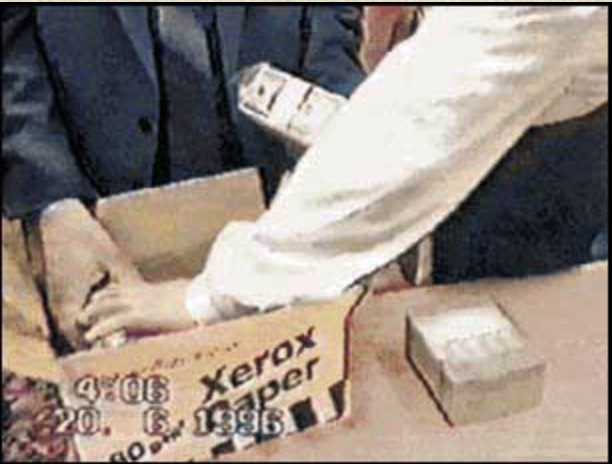Filed Under: Video > Journalism > Evgeny Kiselev intervenes in the “Xerox affair,” 20 June 1996
Evgeny Kiselev intervenes in the “Xerox affair,” 20 June 1996

As President of the Russian Federation since 1991, Boris Yeltsin had governed the nation through waves of political turbulence, economic freefall, and personal scandal. His re-election campaign in 1996 began with an abysmal 6% approval rating and featured shady campaign financing practices, secret back-room deals by Russia’s most prominent oligarchs, and a full-scale media war against opponents. Orchestrated with the help of American election consultants, including George Gorton, Richard Dresner, and Joe Shumate, the Yeltsin campaign pulled no punches — in terms of either money or tactics — in its quest to prop up the flagging incumbent. On 16 June 1996, Yeltsin narrowly won the first electoral round, earning 35.8% of the popular vote and a whisper-thin lead over Communist Party challenger Gennady Zyuganov. The period between 16 June and 3 July, when second-round voting was scheduled to take place, was marked by mounting tensions within Yeltsin’s campaign. Initially headed by Vice Premier and hardline nationalist Oleg Soskovets, the campaign had been reshuffled in March 1996, with privatization tsar Anatoly Chubais emerging as chairman.
On 19 June, the discord between left- and right-wing actors in Yeltsin’s campaign was exposed in spectacular fashion when security guards affiliated with Yeltsin’s more conservative supporters caught Sergey Lisovsky (chairman of the ORT Advertising Agency) and Arkady Evstafyev (an assistant to Chubais) leaving the Russian White House with $500,000 stuffed inside a cardboard box of Xerox-brand copier paper. Lisovsky and Evstafyev were detained and interrogated, the aim apparently being to smear Chubais in Yeltsin’s eyes. Other explanations of the affair suggest the opposite: that Lisovsky and Evstafyev were engaged in some operation that would further discredit their own opponents. Regardless, Yeltsin fired the instigators of Lisovsky and Evstafyev’s arrest that same day, but not before footage of the incident had made it to the Russian media.
At 1:20 AM on 20 June, a disheveled Evgeny Kiselev, host of NTV’s weekly analytical news program Itogi (The Sum Total) (1992-2003), interrupted a regularly scheduled broadcast of the talk show "Café Oblomov" to warn of an impending coup. According to Kiselev, the Xerox episode was part of a shadowy conspiracy to undermine the most effective (read: “liberal”) parts of Yeltsin’s team, thereby throwing off the upcoming second electoral round. The nation, the television host claimed, was about to experience a major subversion of its fledging democratic order. Although neither the origin nor the destination of the $500,000 were ever fully explained, Kiselev’s worst fears proved unfounded: on 3 July, Yeltsin was successfully re-elected. In hindsight, several prominent commentators—including political technologist Gleb Pavlovsky—accused Kiselev and NTV of groundless fearmongering.